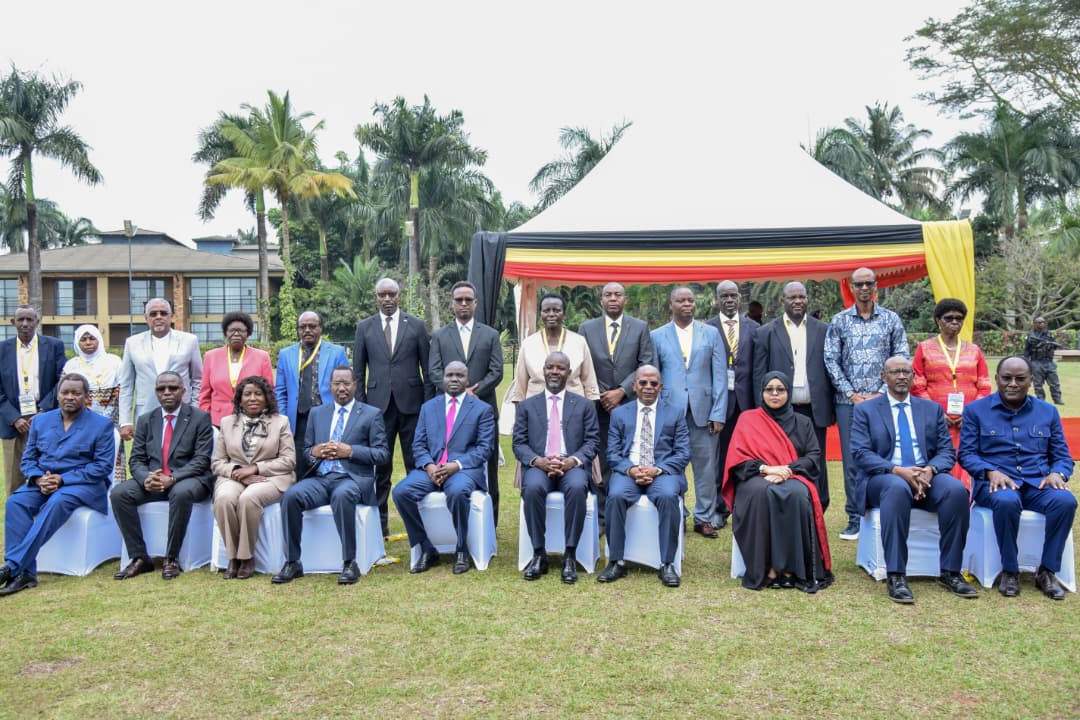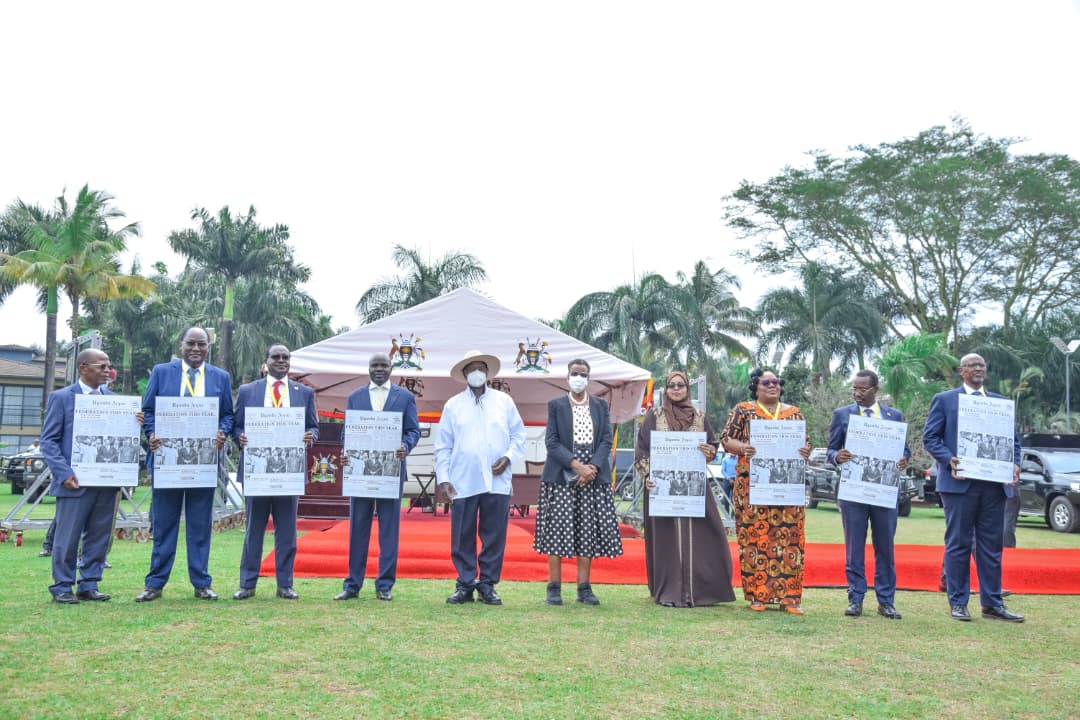By David Isabirye
Ministers responsible for Higher Education from East African Community (EAC) Partner States – Burundi, Democratic Republic of Congo, Kenya, Rwanda, Somalia, South Sudan, Tanzania, and Uganda – have concluded the first-ever Regional Ministerial Conference on the East African Community Common Higher Education Area (EACHEA) was held in Kampala, Uganda, from 9–11 September 2025.
Meeting under the theme “Enhancing Regional Integration through Harmonized Higher Education Systems for Sustainable Development in East Africa”, the Ministers, together with Vice Chancellors and other higher education leaders, higher education regulators, student leaders, industry, and development partners, reaffirmed their collective commitment to transform higher education into a driver of skills, innovation, and integration across the region.
Key Outcomes and Commitments
- Full Operationalization of the EACHEA: Ministers pledged to fast-track alignment of national higher education systems with regional frameworks to promote academic excellence and seamless mobility of students and professionals.
- Mutual Recognition of Qualifications: By 2027, EAC will adopt regional frameworks enabling students and professionals to use their academic and professional qualifications across all Partner States.
- Policy and Legal Harmonization: By 2030, all national higher education policies, laws, and accreditation frameworks will be harmonized with EAC standards, including the East African Qualifications Framework, Quality Assurance Framework, and Credit Transfer System.
- Digital Transformation: Ministers agreed to expand e-learning, blended learning, and virtual exchange programmes, while ensuring clear regulation for the responsible use of digital tools and artificial intelligence in education.
- Sustainable Financing: The EAC will design innovative funding models, including public-private partnerships and development cooperation, to strengthen access, mobility, and research.
- Equity and Inclusion: Ministers pledged to improve access to higher education for marginalized groups and promote gender equality.
- Student Mobility: Ministers directed national councils and commissions for higher education to engage relevant national authorities to remove visa fees for EAC students and professionals and to enforce the directive that EAC nationals pay the same tuition fees as locals, charged in local currency.
Follow-Up
The Ministers agreed that the Regional Ministerial Conference will be held biennially to monitor progress, share best practices, and set new directions. The next conference will be hosted by the Republic of Rwanda in 2027.
Appreciation
The Ministers expressed deep gratitude to the Government and People of Uganda for hosting this historic conference, and to the Inter-University Council for East Africa (IUCEA), the Forum of CEOs of National Higher Education Commissions, development partners, and academic stakeholders for their excellent coordination of the conference and support.

Full Communique:
The Ministers responsible for Higher Education in the East African Community (EAC) Partner States – Republic of Burundi, Democratic Republic of Congo, Republic of Kenya, Republic of Rwanda, Federal Republic of Somalia, Republic of South Sudan, Republic of Uganda, and the United Republic of Tanzania – meeting in Kampala, Republic of Uganda, from 9th to 11th September 2025 for the 1st Regional Ministerial Conference on the East African Community Common Higher Education Area (EACHEA), under the auspices of the Forum of Chief Executive Officers of National Councils and Commissions for Higher Education in East Africa, the Inter-University Council for East Africa (IUCEA)and with the participation of other national education agencies, Vice Chancellors and other heads of institutions, student representatives, professional bodies, industry partners, and development partners;
Having convened under the theme “Enhancing Regional Integration through Harmonized Higher Education‑ Systems for Sustainable Development in East Africa”, to deliberate on progress, challenges, and strategies for the accelerated operationalization of the EACHEA, in fulfilment of our obligations under EAC policy and legal frameworks and in alignment with African continental and global development agendas.
Recalling
- The Treaty for the Establishment of the East African Community, particularly Articles 5, 102, 103, and 104, which commit Partner States to promote harmonisation of educational systems, curricula, examinations, and certification, as well as mutual recognition of qualifications to facilitate free movement of people and regional integration.
- The Inter-University Council for East Africa (IUCEA) Act, 2009, particularly Sections 4 and 6, which mandate IUCEA to coordinate the development of higher education and research to foster a common higher education space in the region.
- The Common Market Protocol, 2010, particularly Article 11 which obliges Partner States to mutually recognize the academic and professional qualifications granted, experiences obtained, requirements met, licenses, or certifications granted, in other Partner States; and harmonize their curricula, examinations, standards, certification and accreditation of educational and training institutions.
- The Declaration of the EAC as a Common Higher Education Area made by the EAC Heads of State on 20th May 2017 in Dar es Salaam, United Republic of Tanzania, which marked a milestone in the harmonization of higher education systems in the region.
Recognizing
- The central role of higher education in producing skilled, innovative, and adaptable human capital necessary for driving the region’s socio-economic transformation, technological advancement, and accelerating deeper EAC regional integration.
- The tremendous efforts made by Partner States in establishing unique and quality higher education systems that have shaped and contributed to the development of skilled and knowledgeable graduates necessary for national and regional development.
- The progress made by Partner States, IUCEA, National Councils/Commissions for Higher Education and other stakeholders in developing and implementing relevant regional higher education frameworks such as the East African Qualifications Framework for Higher Education (EAQFHE), the Regional Quality Assurance Framework (RQAF), the East African Community Credit Accumulation and Transfer System (EAC-CATS), the EAC Regional Programme Accreditation Framework, and the Research Excellence Framework for Higher Education in East Africa (REFHE-EA).
- The growing opportunities for collaboration in cross-border education and research, and in student and staff mobility, both within the EAC and in collaboration with other continental and global academic partners.
Acknowledging
- Persistent challenges facing higher education in the region, including:
-
- Disparities in policy and regulatory frameworks across Partner States evidenced by uneven alignment of national legal and policy frameworks with regional higher education frameworks.
- Limited financing for higher education and research, constraining institutional capacity and innovation, system enhancement and the full implementation of the EACHEA.
- Limited infrastructure for modern teaching, research, and innovation, especially in science, technology, engineering, and mathematics (STEM) fields.
- Limited digital connectivity and integration of technology in teaching and learning and the management of higher education institutions.
- Disparities in the adoption of mutual recognition arrangements for academic and professional qualifications.
- Suboptimal intra-EAC academic mobility occasioned by, among other things, underfunding and limited enforcement of the directive of Council of Ministers of charging the same fees for students coming from other EAC Partners States as locals and that the fees are charged in local currency.
- Existence of visa fee charged on students and other professionals from another partner state thus affecting student and labour mobility.
- The need to strengthen the linkages between higher education systems and other regional development priorities under the EAC Vision 2050, the African Union’s Agenda 2063, and the UN Sustainable Development Goals (SDGs).
- The essential support of development partners, the private sector, and international education agencies in capacity building, infrastructure development, and policy harmonization.
Deliberations
The Ministers considered reports and recommendations from technical sessions addressing:
- The current status and gaps in the operationalization of the EACHEA and the extent of compliance with regional higher education frameworks.
- Legislative, policy, and regulatory reforms required to align national higher education systems with the EAC regional frameworks.
- Strengthening the EAQFHE to ensure comparability, transparency, credibility and portability of qualifications across the region.
- Enhancing the RQAF to ensure robust and consistent quality standards in all Partner States.
- Strategies to expand academic and professional mobility through harmonised admissions criteria, joint degree programmes, innovative student and staff mobility schemes and the mutual recognition of qualifications.
- Accelerating digitalization of higher education, including virtual exchange programmes, online learning platforms, and open educational resources by leveraging existing and emerging digital technologies to promote open and distance learning and increase higher education access while paying attention to the need to harmonize the regulation of digital tools and use of AI in teaching, learning and research.
- Addressing equity in higher education, ensuring access for marginalized groups, and promoting gender equality.
- Designing sustainable financing models including dedicated regional funds, public-private partnerships, and innovative resource mobilisation approachesand financing a Regional Students Mobility Fund to deepenacademic mobility and regional integration.
Resolutions and Commitments
We, the Ministers, hereby:
- Reaffirm our unwavering commitment to the full operationalisation of the EACHEA as a mechanism to strengthen academic excellence, facilitate knowledge mobility, and serve as an engine for deepening regional integration, socio-economic transformation, and global competitiveness of the EAC region.
- Resolve to align the respective national higher education systems with the regional higher education framework requirements, without imposing uniformity.
- Commit to enhancing mutual recognition of academic and professional qualifications through development of relevant Regional Frameworks for Mutual Recognition of Academic and Professional Qualifications to promote seamless mobility of students, staff, and professionals across the region in line with the EAC Common Market Protocol – by 2027.
- Resolve to harmonise national higher education policies, legislation, and regulatory frameworks including accreditation frameworks with the EAC regional instruments – including the EAQFHE, RQAF, EAC-CATS, REFHE-EA — by 2030.
- Promote the integration and regulation of digital, open and blended learning systems, including cross-border e-learning platforms and virtual exchange programmes, to widen access, improve quality and learning outcomes, and enhance resilience against disruptions in the delivery of higher education.
- Mobilise sustainable financing for higher education through national and regional resource pooling mechanisms, development cooperation, commercialization of research and private sector engagement.
- Implore the IUCEA to work with the Commissions and Councils for Higher Education to developmechanismsto monitor and report on alignment of institutional frameworks with regional frameworks.
Directives to Stakeholders
- IUCEA in collaboration with the Forum of CEOs of National Commissions and Councils for higher education, to develop and disseminate detailed guidelines to assist HEIs in integrating EAC regional frameworks into their institutional policies and academic programmes.IUCEA shall report annually to the Sectoral Council for Education, Science, Technology, Culture and Sports on the status of EACHEA implementation.
- IUCEA and the Forum of National Councils and Commissions for Higher Education to fast-track the full implementation and periodic review of the EACHEA and to establish and maintain a Regional Database of accredited institutions and programmes, publicly accessible across Partner States.
- IUCEA in conjunction with the Forum of CEOs of National Councils and Commissions for Higher Education in EAC Partner States to develop proposal for the establishment of a regional mobility fund.
- National Councils and Commissions for Higher Education to designate national focal points to coordinate EACHEA activities, monitor progress, and ensure effective linkages between national and regional structures.
- National Councils and Commissions for Higher Education to ensure the full implementation of the Council of Ministers’ directive to charge the same fees for students coming from other EAC Partners States as locals and that the fees are charged in local currency.
- National Councils and Commissions for Higher Education to engage the relevant national authorities toexpedite the removal of visa requirement charged on students and other professionals from another EAC Partner States to promote regional mobility.
- National Councils and Commissions for Higher Education to ensure that Higher Education Institutions oversee institutional alignment of education systemswith regional frameworks.
- Development partners are encouraged to align their investments in higher education with EAC regional priorities, focusing on capacity building, infrastructure development, digital transformation, and research collaboration.
Follow-up Mechanism
We agree that the Regional Ministerial Conference on the EACHEA shall be convened biennially, with national Councils/Commissions for higher education driving the coordination at the national level and IUCEA serving as the Secretariat, to review progress, share best practices, address emerging issues, and adopt new policy directions.
The next Ministerial Conference will be hosted by the Republic of Rwanda in 2027.
Expression of Appreciation
We express our profound appreciation to the Government and People of the Republic of Uganda for their warm hospitality, and to IUCEA for its leadership in coordinating the organisation of this historic Regional Ministerial Conference on the EACHEA. We acknowledge the great work of the Forum of CEOs of National Councils/Commissions for higher education in the EAC Partner States for the great coordination of this event at the national level.
We also recognise the valuable contributions of development partners, the private sector, academia, professional bodies and student bodies whose engagement and expertise continue to shape the future of higher education in the region.
Adoption
Adopted in Kampala, The Republic of Uganda, this 11th day of September 2025, by the Ministers responsible for Higher Education in the East African Community Partner States.
Signatures:
| Name & Title | Flag | Country | Signature |
| H.E. Prof. François Havyarimana,
Minister of National Education and Scientific Research |
Republic of Burundi | ||
| H.E. Marie-Thérèse Sombo Ayanne Safi Mukuna,
Minister of Higher and University Education |
Democratic Republic of Congo | ||
| Hon. Julius Migos Ogamba,
Cabinet Secretary for Education |
Republic of Kenya | ||
| Hon. Joseph Nsengimana,
Minister of Education |
Republic of Rwanda | ||
| Hon. Nura Mustaf Mukhtar,
State Minister of Education, Culture and Higher Education |
Federal Republic of Somalia | ||
| Hon. Madut Biar Yel,
Minister of Higher Education, Science and Technology |
Republic of South Sudan | ||
| Hon. Janet Kataha Museveni,
First Lady and Minister of Education & Sports |
Republic of Uganda | ||
| Prof. Daniel Elias Mushi,
Deputy Permanent Secretary, on Behalf of the Minister of Education, Science and Technology |
United Republic of Tanzania |
MATRIX ON IMPLEMENTATION OF RESOLUTIONS
| S/N | Resolution | Timeline |
| 1. | IUCEA, in collaboration with the Forum of CEOs of National Commissions and Councils for higher education, to develop and disseminate detailed guidelines to assist HEIs in integrating EAC regional frameworks into their institutional policies and academic programmes. IUCEA shall report annually to the Sectoral Council for Education, Science, Technology, Culture and Sports on the status of EACHEA implementation. | 1 year |
| 2. | IUCEA and the Forum of National Councils and Commissions for Higher Education to fast-track the full implementation and annual review of the EACHEA and to establish and maintain a Regional Database of accredited institutions and programmes, publicly accessible across Partner States. | 1 year |
| 3. | Partner States to designate national focal points to coordinate EACHEA activities, monitor progress, and ensure effective linkages between national and regional structures. | 6 months |
| 4. | Partner States to ensure the full implementation of the Council of Ministers directive to charge students the same fees for students coming from other EAC Partners States as locals and that the fees are charged in local currency. | Immediate |
| 5. | Partner States are requested to expedite the removal of visa requirement charged on students and other professionals from another EAC partner states to promote regional mobility. | Immediate |
| 6. | National Councils and Commissions for Higher Education to ensure that Higher Education Institutions establish internal compliance committees to oversee institutional alignment with regional frameworks. | 1 year |
| 7. | IUCEA in conjunction with the Forum of CEOs of National Councils and Commissions for Higher Education in EAC Partner States to develop proposal for the establishment of a regional mobility fund. | 2 years |





